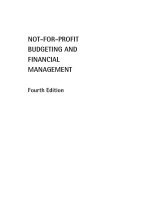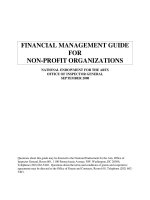Financial management for development projects
Bạn đang xem bản rút gọn của tài liệu. Xem và tải ngay bản đầy đủ của tài liệu tại đây (94.92 KB, 4 trang )
Financial management
for development projects
Turin, Italy
International Training Centre
www.itcilo.org
Financial management for development projects
Introduction
Financial management is more than an
administrative and control function. Sound
financial management is a critical prerequisite for
successful project delivery. Timely and precise
financial data are indispensable for effective
decision-making as well as corrective action by the
project management in order to enhance the
prospects of timely completion within the planned
project budget and scope of deliverables.
Sound project financial management provides:
! essential information needed by those who
manage, implement and supervise projects,
including government oversight agencies and
financing institutions;
! the comfort needed by the recipient country,
lenders and donor community that funds have
been used efficiently and for the purposes
intended; and
! a deterrent to fraud and corruption, since it
provides internal controls and the ability to
quickly identify unusual occurrences and
deviations.
In view of the current efforts to harmonise
accounting and financial management procedures,
the course is designed to promote improved
compliance with the financial reporting and
control requirements of national governments as
well as international finance institutions. It will
guide the participants in the preparation of
periodic financial monitoring reports that suit the
reporting exigencies of their projects with respect
to the four key parameters of project delivery
namely cost, time, scope and resources.
Throughout the course the participants will
acquire the competencies needed for setting-up
the various components of an integrated project
financial management system with corresponding
modules/procedures for planning and budgeting,
accounting, financial reporting, internal control,
auditing, procurement and disbursement. The
presence of such a system will enable timely
measurement of project achievements with respect
to physical performance (delivery of project
outputs) as well as progress towards achieving
project objectives.
The course materials are designed to enable
assessment of learning achievement by the trainer
and the learner through exercises, group work and
practical case studies.
Objectives
Course participants will be able to competently
design and operate project financial management
systems and execute corresponding
payments/disbursements in accordance with sound
professional standards and the harmonised
requirements of donors and their respective
governments.
Participants
This course addresses project directors and
accounting and financial management staff
engaged in the implementation of development
projects particularly those of the United Nations,
International Financial Institutions, and
EU-funded projects.
Candidates are expected to have basic knowledge
of accounting in the public or private sector and
reasonable fluency in written and spoken English.
Course methodology
The course is delivered by senior financial
management specialists/advisors with profound
knowledge of the financial management
environment in development projects. The course
is conducted using a highly-participative training
delivery methodology through a combination of
presentations by subject-matter specialists
followed by self-assessment exercises/assignments
and group work intended to facilitate the practical
application of project financial management
principles and procedures. Ample opportunity is
provided to discuss common problems in financial
management and disbursement and ways and
means to overcome specific constraints faced by
the participants in the implementation of their
projects.
Payment / disbursement
! Payment/disbursement procedures of the
funding agency or national government
! Letters of Credit and special payment
procedures
! IMPREST account/special account
! Common payment/disbursement problems in
donor-funded projects
Each participant is encouraged to bring along a
copy of the financing agreement, the Project
Appraisal Document and any relevant operations'
manuals related to his/her project for reference
throughout the course.
Course contents
General
! Project cycle and relevant project
documentation
! Procurement guidelines of funding agencies
and related standard bidding documents (World
Bank procurement guidelines are used in the
course as a model)
FInancial management
! Introduction to project financial management
! Project financial management activities
!
!
!
!
!
!
!
!
!
i
throughout the project cycle of a development
project
Factors influencing optional design of a project
financial management system
Internal control
Planning and budgeting
Accounting systems
Computerisation of accounting systems
Financial monitoring reports
Annual financial reports
Auditing arrangements
Common project financial management
problems
Cost of participation
The cost of participation in this two-week
programme is Euro 3,250 payable in advance by
the participant's sponsoring organisation. This
covers:
! tuition fee, which includes the use of the
Centre's training facilities and associated
support services, books and training materials;
! participant fee, which covers:
– accommodation and full-board at the Centre,
plus a lump sum to cover incidental expenses;i
– routine medical care and insurance.
Main travel between the participant's home
country and Turin is not included.
Fellowships for training programmes conducted by
ITC-ILO generally become available through the
training budgets of development projects financed
by International Financial Institutions or by United
Nations' agencies, bilateral technical co-operation
agencies, governments and/or private enterprises.
Candidates are encouraged to contact these
organisations and agencies in their countries to
enquire about the availability of funds for
fellowship training programmes.
Arrangements can be made to pay an additional allowance for incidental expenses at government or funding-agency
cost to accommodate participant entitlements or other government requirements.
The ILO Turin Centre's facilities
Located in an attractive park on the banks of the River Po,
the Centre’s campus provides a congenial environment in
which to live and study.
l a bank;
It contains 21 pavilions with fully equipped modern
classrooms, conference halls and meeting rooms fitted
out for multilingual simultaneous interpretation, a
computer laboratory, and a computerized documentation
centre linked to various data banks.
l a post office;
The campus has 287 study/bedrooms, all with private
bathrooms, telephones and cable television. It also has:
l an infirmary.
l a reception desk open 24 hours a day;
l a restaurant, a self-service canteen and a coffee
lounge, all catering for international dietary needs;
l a travel agency;
l a laundry service;
l an internet point;
l a recreation room;
l facilities for outdoor and indoor sports;
Social events are regularly held both on and off campus,
so that participants from different cultural backgrounds
can make the most of the stimulating international
climate.
For further information, please contact:
International Training Centre of the ILO
Sustainable Development and Governance
Viale Maestri del Lavoro 10
10127 Turin (Italy)
Phone: +39 011-693 6512
Fax: +39 011-693 6351
E-mail:
Designer Luca Fiore - Printed by the International Training Centre of the ILO, Turin, Italy









